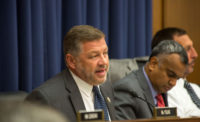Norman Y. Mineta, a giant of U.S. transportation policy who as U.S. Dept. of Transportation Secretary led the aviation system through the 9/11 terrorist attacks and their aftermath, and as a 10-term House member played a key role in major surface transportation legislation, died on May 3 at his home in Edgewater, Md., according to published reports. He was 90.
“What a tremendous loss,” says Brian Turmail, Associated General Contractors of America’s vice president for public affairs and strategic initiatives.
Jim Tymon, American Association of State Highway and Transportation Officials executive director, said in a statement, “The transportation community lost a leader, a trailblazer and a friend with the passing of former Transportation Secretary Norm Mineta.”
Mineta was the first Asian-American to head DOT. During World War II, as a 10-year-old, he and his family were forced into U.S. internment camps along with thousands of other Japanese-Americans.
Mineta told ENR in a 1993 interview that his "proudest moment" in the House was when the chamber passed his bill to provide restitution to those detainees.
Long Career in the House
A former mayor of San Jose, Calif., Mineta was elected to the House in 1974 and began his long tenure on what was then called the House Public Works and Transportation Committee.
It was on that panel that Mineta came to be one of the most important congressional lawmakers to construction and engineering groups.
The panel, since renamed the Transportation and Infrastructure Committee, had, and still has, broad jurisdiction over a range of types of infrastructure, including highways, transit, airports and wastewater treatment.
In 1991, Mineta played a key role in in developing what became the Intermodal Surface Transportation Efficiency Act, or ISTEA. One important provision in ISTEA was increased flexibility for states to transfer highway funds for transit purposes.
Mineta told ENR in the 1993 interview that in late 1992, newly-elected President Bill Clinton approached him about becoming DOT secretary, but Mineta declined.
He said Clinton asked him, “You sure you won’t take it?” and later called back to ask, “You sure?” and he said, “Mr. President, I really, really am sure.”
In 2000, Mineta accepted Clinton's offer to serve as Secretary of Commerce for the final months of his term in office.
After George W. Bush was elected President, he approached Mineta about the top DOT job and, though the two men were from different political parties, Mineta this time said yes.
On Sept. 11 of the following year, Mineta faced was likely his toughest challenge, when terrorists attacked the World Trade Center in New York City and the Pentagon.
Mineta grounded commercial flights and instituted security protocols and guided the startup of the Transportation Security Administration.
John Aitken, director of what in 2001 was renamed Mineta San Jose International Airport, said in a statement that Mineta "perhaps, will be best remembered for his decisive actions as Secretary of Transportation [who] kept America safe on and after Sept. 11, 2001.”
Mineta retired from DOT in 2006.
Tributes from APTA, AASHTO, AGC
At the news of Mineta's death, officials from groups representing varied transportation modes offered praise for his career and accomplishments. From Mineta's days as San Jose mayor, he was credited as being an advocate of “smart growth.” Paul Skoutelas, American Public Transportation Association president and chief executive officer, said in a statement that Mineta, in his years in the House and at DOT, “dedicated his life to bringing the benefits of public transit to communities across the country.”
AASHTO's Tymon added, “Secretary Mineta’s lifetime service to his country, his ability to work with people across the political divide, his far-reaching knowledge and his reputation as a leader who would get the job done are part of his profound legacy.”
AGC of America's Turmail—who worked directly for Mineta at DOT as deputy director of public affairs—said in an email to ENR, “For someone who had every reason to resent his country, he was instead a tireless advocate for involvement in politics and government."
Turmail adds, “There are generations of people, including many Asian Americans and Pacific Islanders, who are involved in politics because of Secretary Mineta’s mentorship and encouragement.” And that Mineta was ”never too important to remember a name or a birthday, he was a kind man with a wonderful sense of humor who showed America it was OK to have friends on either side of the aisle.”
Turmail continues. “He kept a journal of every flight he ever took. Today his journal would record his final flight, to a place among the many great leaders this country has produced.”
President Joe Biden on May 6 signed into law a measure that renames the DOT headquarters building in Washington, D.C., for Mineta and William T. Coleman Jr. DOT's Secretary from 1975 to 1977.
Coleman, an attorney by training, worked under Thurgood Marshall of the NAACP to co-author the brief in the landmark Brown v. Board of Education civil rights case.
Story updated on 5/6/2022 with signing of legislation to name the DOT headquarters building in Washington, D.C. for Mineta and William T. Coleman, Jr.





